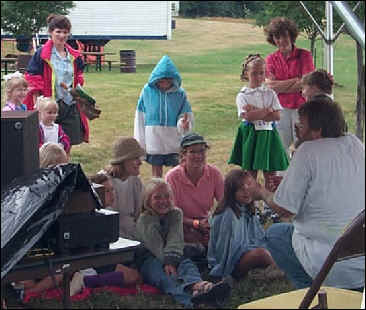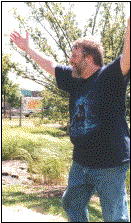|
|
Valparaiso’s
Gaelic Festival gave me the
chance to prove, once and for all, that Storytelling is not just
for kids. Irish and
Scottish folktales were the order of the day – a little wit, a little
wisdom; and I performed, both on the main stage, for the ‘beer-tent’
crowd, and in the children’s tent, for the ‘wee’ ones and their
families. |
|
And Celeste face-painted, and hand-painted, and arm-painted:
|
|
| We were both back for the Front Porch Folk Festival on September 4th. That was at Sunset Hill Farm Park, Highway 6 & Meridian, in Porter IN. | |
My favorite stories to tell are ethnic stories – folktales born of the cultural diversity we all share. There is a universality to them – an underlying truth they share -- that belies the various nationalities that birthed them and claim them. Native American, Japanese, Russian, Swedish, Chinese, Polish, Scandinavian, Irish, Indian … stories know no national boundaries. Or shouldn’t. And the same should be true of Storytellers. What-ever their origins, tales and tale-telling are meant to be shared.
 This
does not mean that stories can be excised cleanly from the culture that
nourished them; though some stories sound amazingly like other stories
from other lands, they are not – necessarily – the same.
There are cultural nuances that demand attention, that distinguish one
version of a tale from another. And
it is the responsibility of the Story-teller to explore those nuances, to try to
learn those subtleties; Storytelling is not in-tended to sterilize with clinical
precision but to seed and nurture and grow.
This
does not mean that stories can be excised cleanly from the culture that
nourished them; though some stories sound amazingly like other stories
from other lands, they are not – necessarily – the same.
There are cultural nuances that demand attention, that distinguish one
version of a tale from another. And
it is the responsibility of the Story-teller to explore those nuances, to try to
learn those subtleties; Storytelling is not in-tended to sterilize with clinical
precision but to seed and nurture and grow.

And this is not an easy burden to shoulder.
Where possible, it is preferable to share
the weight of the Storyteller’s responsibility … with teacher or librarian
… with someone who can cultivate the story-sown seed.
Where impossible, it is preferable to own a ‘workshop’ environs, or
an academic milieu
|
‘Possible’
is not a festival. ‘Possible’ is not some venue a Storyteller
has been hired to queue into a larger bill of fellow entertainers. ‘Possible’
is not intended to educate or elucidate or illustrate... “Next!” |
|
 To
compensate in some small measure for this, Celeste and I have devised a
compromise program of sorts that combines a bit of word with a wit of craft.
She instructs children in a craft drawn from an-other country; I share a
tale drawn from the same source. 'A
little bit of this, a little bit of that’ is not the answer, of
course, but it’s a start.
To
compensate in some small measure for this, Celeste and I have devised a
compromise program of sorts that combines a bit of word with a wit of craft.
She instructs children in a craft drawn from an-other country; I share a
tale drawn from the same source. 'A
little bit of this, a little bit of that’ is not the answer, of
course, but it’s a start.
We tried it out at Warrenville Folk Festival where it seemed to go over well in the brief time slots we shared. We elaborated on the program at a week-long Lloyd Shaw Dance Camp in Cumberland KY. It went over very well; we ‘taught’ a nature studies class and an international crafts class. Into the latter we also incorporated dance and costume, drawing upon the talents of some of the other ‘campers.’


